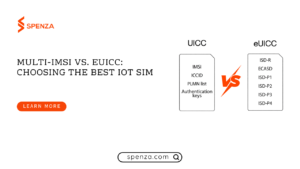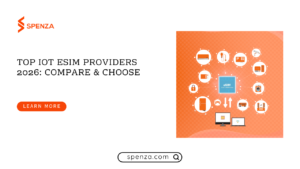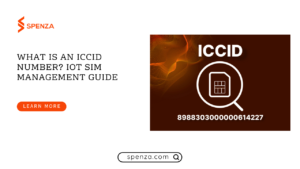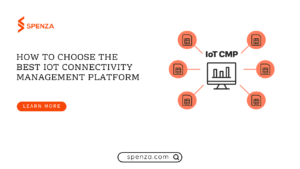
Table of Contents
- Introduction
- You Don’t Need to Be a Telco to Launch a Mobile Service
- The Four-Step Guide to Launching Your Brand’s MVNO
- Step 1: Use Your Brand to Build a Mobile Product
- Step 2: Define Your Mobile Value Proposition
- Step 3: Choose the Right Technology Partner (Your MVNE)
- Step 4: Go-to-Market Using Your Existing Channels
- Few Examples of Non-Telco Brand MVNOs
- Spenza: Your Turnkey Platform for a Non-Telco MVNO
- Case Study: How a Smartwatch Brand Became a Successful MVNO
- Conclusion: Your Brand’s Future in Mobile Starts Today
- FAQs
Introduction
What if your brand could offer its own mobile service? If you’re leading a retail chain, a financial app, a smart device company, or even a fitness brand, you already own what matters most: the customer.
But what if you could increase the lifetime value of each user? What if you could offer your own SIM or eSIM, bundle mobile data with your products, or even turn connectivity into a new revenue stream?
Over 30% of MVNOs today focus on niche markets like IoT, enterprise, and digital-only models. These aren’t old-school telecom players. These are brands just like yours. In this blog, you’ll learn exactly how to start a MVNO, how the MVNE model powers this shift, and why 2025 is the best time to make your move.
What Would You Get by the End of the Article?
- A full guide on how to start a MVNO in 2025.
- A step-by-step plan to build your own mobile brand without being a telecom company.
- Clear explanation of the MVNO business model.
- Insights on white label MVNO and private label MVNO options.
- Why Spenza is the best MVNO partner for non-telecom brands.
- A case study of a real brand using Spenza to become a MVNO reseller.
You Don’t Need to Be a Telco to Launch a Mobile Service
Still unsure if your brand should offer mobile services? You’re not alone. There are many outdated myths around MVNO setup and telecom complexity. But as we’ve explained in MVNO Launching Myths Busted, launching an MVNO today is easier than ever, especially when you’re backed by the right MVNE partner.
Starting a mobile service used to be hard. You needed direct deals with mobile network operators (MNOs), teams to manage billing systems, and deep telecom knowledge.
Not anymore.
Thanks to modern MVNEs like Spenza, all the hard telecom parts are taken care of. You don’t need to build a BSS or OSS. You don’t need to spend years in contract negotiations. Instead, you can work with an MVNO partner like Spenza, which already has all the systems, MNO agreements, billing, provisioning, and compliance set up.
This is how to start a MVNO in today’s world: as a brand, you focus on the customer experience. The MVNE does the rest.
The Four-Step Guide to Launching Your Brand’s MVNO
You don’t need to build everything from scratch. To start a MVNO in 2025, you just need four focused steps. These steps help you move fast, stay in control of your customer experience, and avoid the complexity of traditional telecom setups.
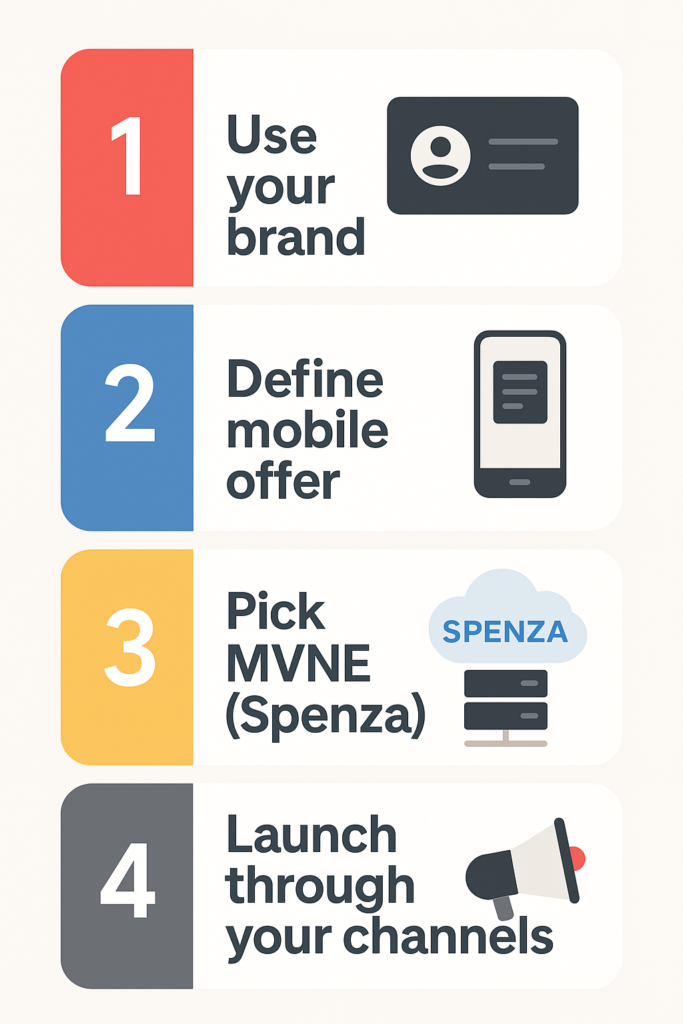
Step 1: Use Your Brand to Build a Mobile Product
Your brand is your biggest advantage. You already have a customer base. You have their trust. Now you can add mobile service into that relationship.
Start by asking: how can mobile strengthen your business?
A gym chain might include free data for its app. A digital bank could include mobile plans with debit cards. A smartwatch brand might sell devices with built-in eSIM data. These ideas are not theory. They are already happening.
You don’t need telecom experience. What you need is a clear brand strategy. The MVNO business model lets you wrap telecom into your customer ecosystem.
Use Cases
- Retail loyalty: Reward customers with mobile data
- Fitness wearables: Add SIM to devices for seamless use
- Banking bundles: Add mobile service to financial products
You are not selling a mobile plan. You are making your brand experience stronger with a mobile layer.
Step 2: Define Your Mobile Value Proposition
Now decide what makes your mobile offer special. The tech comes later.
Will you offer cheaper plans? Special pricing for existing users? Extra perks for loyalty?
Keep it simple. Customers want clarity. Most successful MVNOs offer just 2 to 3 plans.
Common Differentiators
- Unlimited data vs tiered pricing
- Priority support for subscribers
- Plans bundled with physical products
- Postpaid billing for predictability
And here’s a data point you must know: postpaid MVNOs are growing the fastest from 2024 to 2032. Why? Users like to pay after use, especially if it comes with perks.
Don’t overcomplicate. Focus on one or two things that your brand does best.
Step 3: Choose the Right Technology Partner (Your MVNE)
Before you choose your partner, it’s smart to understand the differences between MVNE, MVNA, and MNO models. We explain these clearly in MVNE vs MVNA vs MNO.
If you’re evaluating providers, refer to How to Choose the Right MVNE Provider for a practical checklist designed for business owners and product teams.
This is the step that makes or breaks it.
You don’t have to build infrastructure. You need a MVNE that already has it.
This is where Spenza comes in.
An MVNE like Spenza manages your telecom backend. That includes billing engines, provisioning, carrier agreements, analytics, SIM activation, and compliance. You don’t spend months negotiating with operators. You connect to Spenza’s system and focus on your go-to-market.
Spenza is made for brands. It supports both traditional MVNO and IoT-focused deployments.
Step 4: Go-to-Market Using Your Existing Channels
You already have sales channels. Use them.
- Promote plans on your website
- Add sign-up options in your app
- Offer plans in your stores
- Send personalized offers to email subscribers
No need for a telecom call center. Your MVNE manages activations, billing, SIMs, and compliance. You just focus on your users.
And it works. Opensignal reports that brand MVNOs (like retail and digital brands) in the U.S., U.K., and Mexico keep gaining more BYOD users than they lose. That’s what they call WPL > 1.
Your brand power gives you a big head start. Use it well.
Few Examples of Non-Telco Brand MVNOs
Non-telecom brands are no longer asking if they should enter the mobile space. They’re asking how. Across industries, strong brands are turning to MVNO private label platforms to create mobile products tailored to their customers.
These examples show how a diverse group of companies has used the MVNO business model to extend their services.
| Brand Type | MVNO Offering | Result |
|---|---|---|
| Retail | Mobile plans with purchase rewards | Higher purchase frequency and retention |
| Fitness Tech | SIM-enabled smartwatches | Monthly recurring ARPU from device users |
| Fintech | Postpaid plans with credit score tracking | Increase in app engagement and loyalty |
| Media App | Ad-free streaming with MVNO subscription | Boost in paid user base |
| Smart Home Brand | IoT connectivity bundled with devices | Faster hardware adoption and service upsell |
Each of these cases uses a white label MVNO approach. That means they don’t need to manage carrier relationships or back-end systems themselves. Instead, they work with a technology partner like Spenza that supports full BSS/OSS, provisioning, SIM inventory, and integrations with multiple networks.
From a technical standpoint, MVNO solutions like Spenza allow brands to use real-time APIs to activate SIMs, track user behavior, manage billing, and monitor usage across devices. This enables fast iteration on pricing, bundled services, and customer retention strategies, all without having to build telecom infrastructure.
For more on where the industry is headed, read our MVNO Trends 2025 blog.
Spenza: Your Turnkey Platform for a Non-Telco MVNO
Spenza is not just another MVNE. It is built from the ground up for modern use cases. Whether you’re planning a white label MVNO for consumers or launching IoT products that need global data, Spenza supports you from day one.
Features and Benefits
- Works with both SIM and eSIM
- Full billing system included
- You get branded apps and portals
- Real-time usage tracking
- Smart provisioning tools
- Fast integration with multiple MNOs
- Global coverage in over 190 countries
You stay focused on your brand. Spenza handles the rest.
Speed to Market
With Spenza, you can start a MVNO in just weeks. Not years. No waiting for custom integrations or long contracts. The platform is ready.
MVNO Private Label Options
You don’t need to become a telecom expert. You just need a partner who already is. Spenza’s MVNO private label solution gives you a ready-made telecom backend under your own brand.
Case Study: How a Smartwatch Brand Became a Successful MVNO
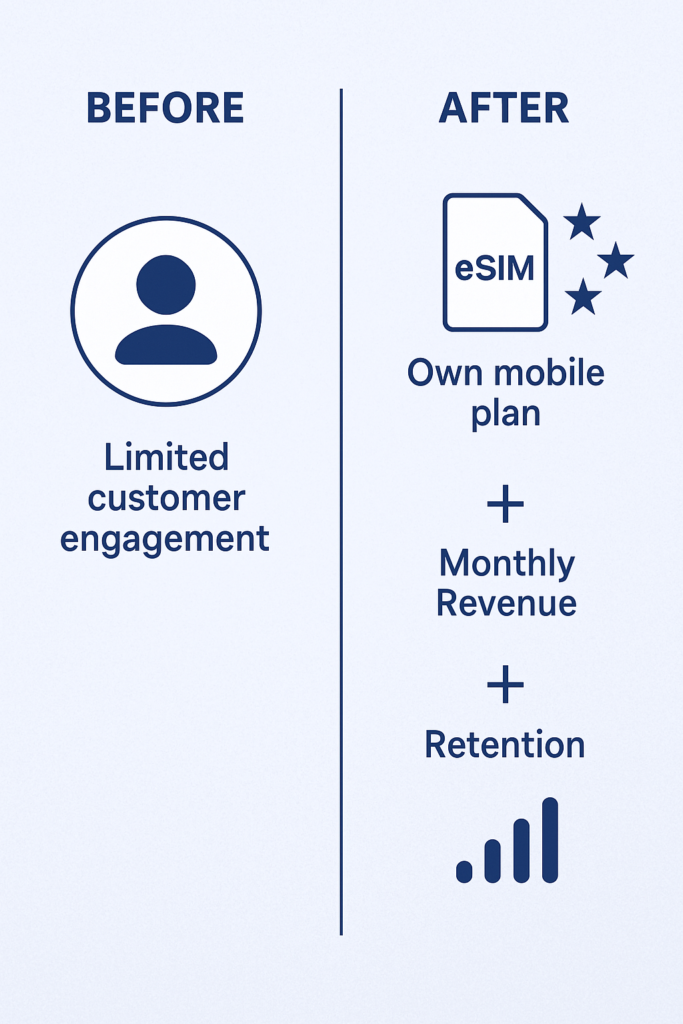
.
The Challenge: The brand wanted to keep users engaged after the watch was sold. They needed something that brought users back every day and gave them ongoing value.
The Solution: They launched their own mobile plan using Spenza’s white label MVNO solution. The watch included an eSIM, already set up. Users could connect the watch without needing a phone.
The Result:
- Monthly revenue increased per user
- Customer satisfaction grew
- Loyalty scores went up
They started a MVNO without building any infrastructure. Spenza did it all.
Conclusion: Your Brand’s Future in Mobile Starts Today
Looking to go deeper into the launch process? Read How to Set Up an MVNO in 2025 for step-by-step preparation, including legal, technical, and operational checklists.
You no longer need to be a telecom company to launch a mobile service. Thanks to MVNE partners like Spenza, the hard parts are done. You bring the brand. Spenza brings the network.
So if you’re wondering how to start a MVNO, now is the time to move. Your customers are already using mobile. Why not let them use it with you?
FAQs
MVNO stands for Mobile Virtual Network Operator. It’s a company that sells mobile services using another company’s network.
Yes. You don’t need to own towers or build tech. With an MVNE like Spenza, any brand can offer mobile service.
If you work with a ready MVNE like Spenza, it can take just a few weeks.
It means you get to offer mobile service under your own brand name, but the technology is managed by a provider like Spenza.
It’s a full telecom service that looks like your own brand to the customer, but runs on a backend platform like Spenza.
Ready to explore how your brand can become a mobile provider? Contact Spenza to schedule a consultation.


